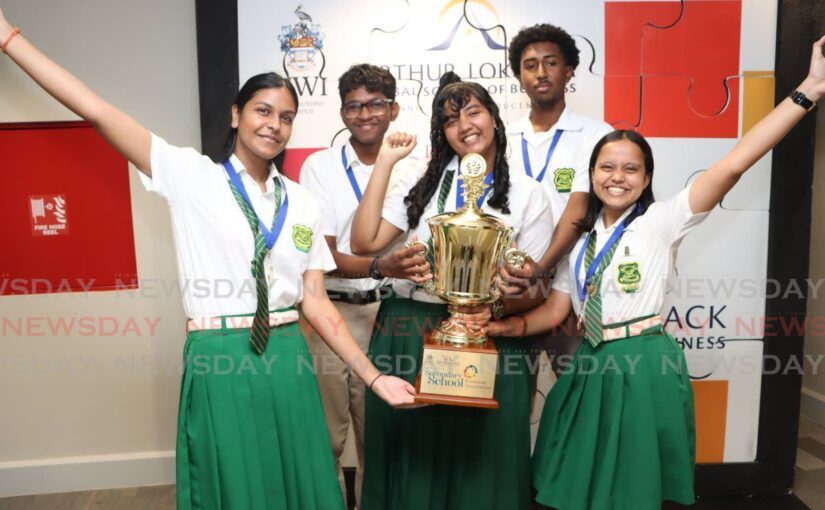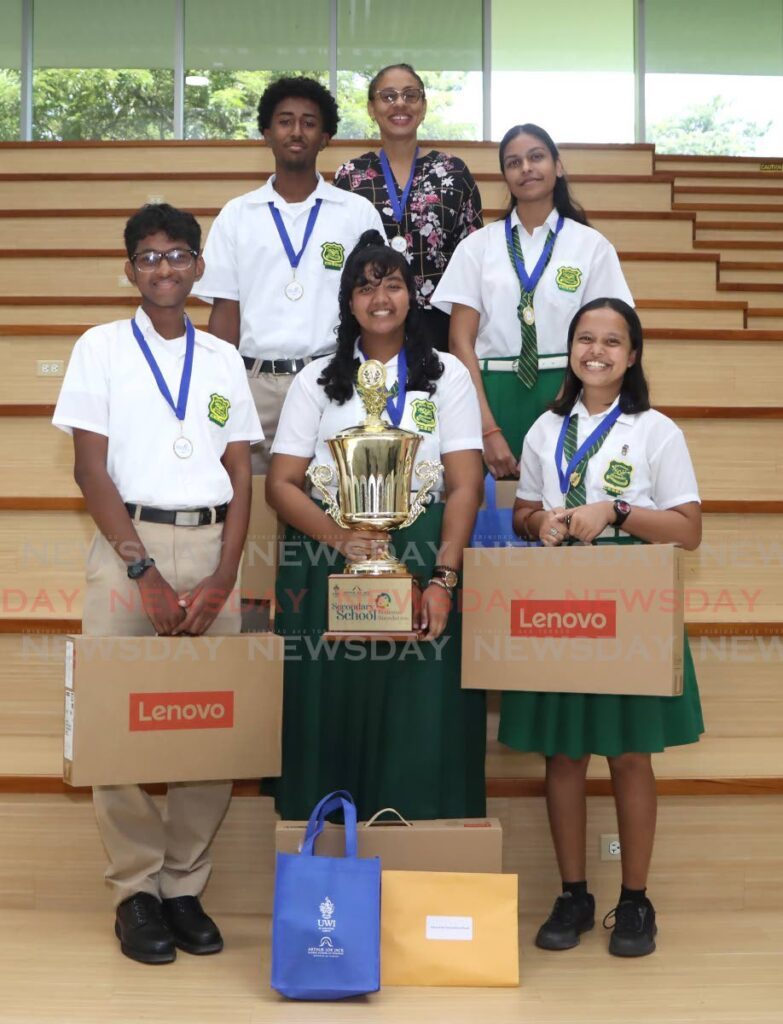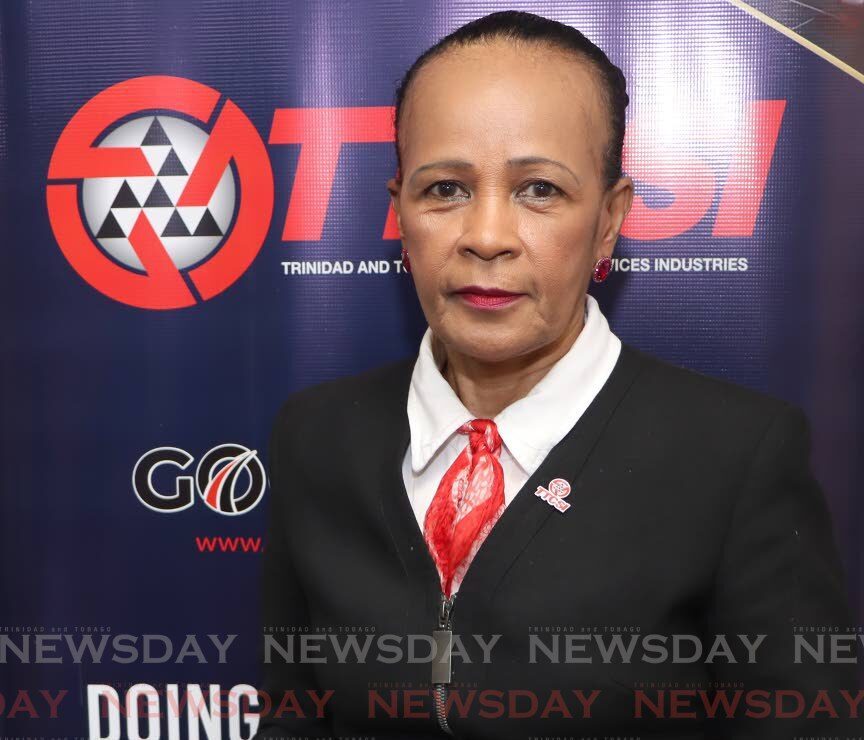Couva East’s virtual business bests the competition
Written by reggietnt868radio on November 21, 2024

Beating 34 other schools, Couva East Secondary took home the first-place trophy for the Arthur Lok Jack Global School of Business’ Secondary School Business Simulation Competition, with its virtual business, Broadbeam, gaining the highest cumulative earnings.
The competitions saw form five and six students engage with a simulation designed to mirror the complex and challenging task of managing a real-life business.
Each school had a team of five students who competed against each other in eight rounds. They were tasked with managing profits, sales revenue, customer demand, investment and expenditure, while also ensuring their business maintained a high-sustainability reputation.
Naparima College took second place and Fatima College came third.
During her acceptance speech at the award ceremony on November 15, Skye Craig of Couva East spoke about the benefits of taking lessons learned in the classroom and applying them to the simulated business.
“There’s something genuinely special about transforming textbook theory into real-world application. It gives life to lessons we’ve been learning and brings us closer to our aspirations.
“This competition has allowed me to work with an extraordinary team, each member bringing their unique strengths to every choice we make together. Throughout this competition we have strengthened our communication skills, refined our decision making and truly become a united and efficient team.
“To my teammates, thank you. Your determination, enthusiasm and humour helped us endure even the most challenging moments. I may be a little biased, but I can confidently say that each of you is a future leader in the making.

Secondary School Business Simulation Competition winners Couva East Secondary School.
(From left, bottom row) Andre Ali Bocas, Skye Craig and Alexandra Hosein.
(Top row) Jaron Metivier, MOB/POB teacher Lisa Nagassar and Sandrina Deo, at the Arthur Lok Jack Global School of Business, Mt Hope on November 15. – Angelo Marcelle
“This accomplishment is not ours alone; it is a proud moment for all of us at Couva East Secondary. “I would also like to acknowledge all our competitors who pushed us to perform our very best and brought out our competitive spirit.”
Speaking to Business Day, Craig said, aside from the practical application of classroom lessons, she also learned more about what it takes to run a business.
“It’s not only about making profits. It’s about supplying, meeting all the demands, doing research, developing marketing ideas and also taking sustainability into consideration.
“And it’s not just about looking at us alone but being able to analyse our competitors’ strategies as well and looking at them and seeing what they put out there so that we can be better.
“What we have also taken away as a group is the importance of communication. As a team we had to communicate and put together our ideas and our resources to come up with decisions to meet the different demands. Not everybody can communicate properly, not everyone can get everyone to participate and move forward.”
Her teammate André Ali Bocas had a similar perspective on the teamwork aspect of the competition.
“We didn’t all necessarily start off as friends. So when we first started there was the initial awkward stage, but eventually we worked through that. I think it helped us to sharpen up on the ability to communicate with people we don’t know, and I think that would help me a lot in the future.”
Mariano Browne, CEO of the Arthur Lok Jack Global School of Business, said the importance of teamwork was one thing every student could take away from the competition.

Mariano Browne, CEO of the Arthur Lok Jack Global School of Business. – File photo by Faith Ayoung
“Everything we do has a human component. So the key thing in working is to work as a team, and recognising that different people have different skill sets and attributes, and those came out in the team working sessions.
“Leaders emerge. You have to have a concept of leadership, a concept of fellowship, a concept of communication, and you have to have a concept of sharing work so it can be integrated and it makes sense. That is one of the most important lessons that’s in no textbook.”
Browne said the driving idea behind the competition was to take what students were learning in class and enhance it in a more practical way.
“The idea was to bring what is in the textbook to life. That’s the hardest part, because most people doing things in a textbook are not experienced in it. Some have families that are in business, so they’ll understand it a bit better, but this simulation was to help bring it to life and bring about a competitive environment to show what the real-world situation is.
“That is in keeping with our ethos and what we do, and how we teach and how we train. So that was the idea: to give students outside of the school that type of experience and exposure.”
He said exposing secondary-school students to business training is important, not only for enhancing their education, but also for helping them figure out their true passions.
“It’s never too early to start. Doing what you like is about a passion, and you wouldn’t know what your passion is until you start doing things you haven’t done before…the idea is it’s never too early to start to train somebody.
“And they are doing these types of subjects in secondary school, and in school, quite frankly, it’s a very dry, arid subject.
“So how does this work in practice? How does this work in the real world? Does this make sense?
“And that was the idea for introducing it. It’s to get them to know there’s a reality between what they’re doing in the textbook and what happens in the real world.”
The competition has been running since 2023 as part of Arthur Lok Jack’s outreach to those considering tertiary business education. This year, being the third cycle, saw the competition evolve.
Lecturer Dr Sherry-Ann Ganase said, “Last cycle it didn’t have a sustainability component, and this time around they included sustainability.
“It accounts for climate change and ensures that they are aware. So we’re bringing awareness to the students on the importance of sustainability…and we did grow, because last cycle we had 25 groups, and this year we had 35 – so maybe we’ll have 45 next cycle.”
Business Day also spoke with teachers from participating schools who gave their views on the competition.
Sheree Bandoo, from Waterloo Secondary School, said she has seen an increase in students showing interest in business studies.
“I think there’s an increasing emphasis on business because students are recognising that every aspect of life is business, so a lot more students are gravitating towards business.
“Normally we have one business class in form four and form five; now we have two business classes. In years gone by, the science class was the most subscribed area of specialisation. Now, out of 175 students, sometimes you have 100 or more students wanting to do business as opposed to sciences.
“At our school, we get a better quality of students wanting to do business. We can only take 60 every year. They do Principles of Accounts (POA) and Principles of Business (POB) and they do fairly well.
“Organisations like this that offer competitions like this, it’s fantastic. Because they really get the opportunity to apply the theories, not in a real-world situation, but as close to real as possible.”
Michael Toussaint from the Providence Girl’s Catholic School expressed hopes that competitions like this will help inspire students to become entrepreneurs.
“In this economy, in my view, undergraduates not really getting jobs. You graduate with a degree, even a postgraduate degree, and you’re still out there, you’re not getting jobs. You’re underemployed and you’re not getting the pay you want to get. So the other option is to go into business for yourself.
“So I think this is a good programme to expose students to the idea of being business owners and being entrepreneurs. Because that creates jobs and it also helps them to earn income while in school, so when they’re finished they don’t have to wonder about waiting five-six years for a job, being underemployed, studying one programme and then doing something else.
“And the students were excited – for the first time they actually get to do some sort of practical stuff concerning a business. We know it was a simulator, but it felt practical.
“We had a group chat and the five students came together and were working on a project together outside of school. They were actually excited to come here to the Arthur Lok Jack School and see the school, and I think it was a good way to market the school, market the programme, the faculty, so the students are very excited.”
The competition is set to start its fourth cycle in 2025.
Browne said, “We hope next year will be bigger, and we have a sponsor next year who has a Pan-Caribbean position. So we may not do it just in TT: we may do it across the Caribbean.”
The post Couva East’s virtual business bests the competition appeared first on Trinidad and Tobago Newsday.




